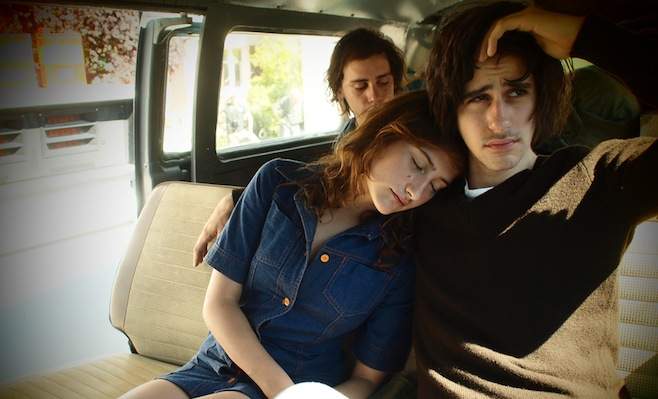After May
A semi-autobiographical look at youths caught up in the political protests following May 1968.
Overview
In Paris, 1971, the shaggy-haired, inscrutable Gilles (Clement Metayer) finds himself swept in political unrest that has fermented since the riots of May 1968. He and his friends are key figures in an underground movement that sells leftist newspapers, meets in secret and carries out targeted attacks.
When his beautiful but enigmatic girlfriend Laure (Carole Combes) abruptly leaves the country, he quickly takes up with the spirited Christine (Lola Créton) instead. Together with Christine and a loose group of friends, he takes part in a street protest which is broken up by sickening violence by the police. The group then up the ante by attacking their school, where armed with Molotov cocktails, they graffiti slogans and drop political pamphlets.
Their plans come unstuck, however, when a security guard is badly injured. With the school searching for the culprits, they decide that it is unsafe for them to stay, and instead hightail it to Italy until the volatile atmosphere cools off. Away from the volatility of their home city, the pace slackens and the film’s focus turns from the political to the personal. As old relationships fray, new ones form as the painter Alain (Felix Armand) meets a wealthy American girl, Leslie (India Salvor Menuez), who is now into spirituality and enlightenment.
Seemingly untroubled by fear at their recent escape from France and at a loss for what to do next, the group attend political film screenings, debate philosophy, make art, smoke constantly and generally exude ennui. It makes for a strangely low-key portrait of an era of upheaval. Interestingly, the tableaus of beautiful youths lounging about in skinny jeans and unbuttoned shirts often looks more like a Calvin Klein advert than a political gathering, possibly because fashion has long since co-opted the look so associated with youthful rebellion in this era.
Increasingly drawn into arguments with Christine about their next move and whether they should get involved with filmmakers working in the revolutionary movement, Gilles still thinks of the estranged Laure and goes to meets her at her decadent and druggy new lodgings. There he shows her an artwork he has done before setting it on fire, having explained it existed for her eyes only.
After May’s failure to engage is surprising given the emotional heft of writer-director Olivier Assayas’ previous work, including his last film he wrote, the superlative Summer Hours. The height of the film’s obtuseness is the performance of Hugo Conzelmann as Jean-Pierre even when blowing up a car he maintains the blankness of a mannequin.
In perhaps the film’s most telling scene, Christine says to the perpetually aloof Gilles “I can’t tell if you’re in love with me”. She will not be the only one guessing at the inner workings or motivations of these characters. After May is a fitfully interesting but ultimately frustrating portrait of a time and place.





